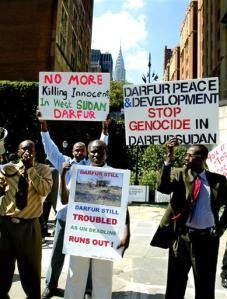UN envoy to Sudan calls for large force to prevent incidents & act as mediator

By EDITH M. LEDERER, Associated Press Writer
UNITED NATIONS, Sep 2, 2004 (AP) — The U.N. envoy to Sudan urged the government Thursday to accept a much larger international monitoring force in the violence-wracked Darfur region with a new mandate to prevent incidents and act as a mediator to help keep conflicts from escalating.
At a Security Council briefing, Jan Pronk elaborated on Secretary-General Kofi Annan’s call for an expanded international force to help decrease the level of violence and enhance the protection of civilians in Darfur, saying it must do more than just investigate past incidents.
“Pro-active monitoring will help to prevent such an incident from taking place,” Pronk said. Monitors must “be on the spot, wherever such incidents might occur, 24 hours a day, also in the camps” and they must “act as mediator in order to help prevent escalation of conflicts and insecurity.”
Sudan’s U.N. Ambassador Elfatih Mohamed Erwa said his government had “no problem” with the expanded mandate for the monitoring force spelled out by Pronk, and he reiterated that increasing its strength was “fine with us.”
Neither Annan nor Pronk said how large a force they wanted, but U.N. diplomats said a U.N. plan presented to the African Union called for about 3,000 peacekeepers. The African Union currently has about 80 military observers in Darfur, protected by just over 300 soldiers, monitoring a rarely observed cease-fire signed in April.
“Whether it is 300 or 3,000, if it helps, that’s fine,” Erwa said late Wednesday.
But Erwa reiterated that Sudan would oppose an international force with another mandate, for example to disarm militias or other groups because that could lead to military confrontations.
Pronk told the council the Sudanese government should seek international assistance if it can’t fully protect its citizens by itself and he made clear the United Nations believes Khartoum needs help because it has failed to stop attacks against civilians in Darfur or disarm the marauding Arab militias responsible for the violence that has killed up to 30,000 people and forced over 1.2 million to flee their homes.
U.S. Ambassador John Danforth, appearing somewhat annoyed at Pronk, said it shouldn’t be up to the Sudanese government to decide whether it can protect citizens.
“The fact of the matter is — and I think Mr. Pronk agrees with this — the citizens of Darfur have absolutely no confidence that the government of Sudan will protect them,” Danforth said.
“I believe that all of the international pressure on the government of Sudan right now has to be focused on the expanded African Union presence. I think without that kind of pressure, the government of Sudan will do its usual job of trying to float through this thing,” he said.
Danforth criticized Pronk for not stating that “the government of Sudan has been directly involved in military action against civilian villages in Darfur, including within the last week.”
Stemming from long-standing disputes over scarce water and arable land, the conflict in Darfur erupted when two African groups rebelled last year accusing Sudan’s Arab-dominated government of siding with the Arab herders. Aid groups have accused the government of encouraging and supporting the militia attacks, a charge Sudanese leaders deny.
On July 30, the council gave the government 30 days to demonstrate that it was taking action to curb the Arab militias, and improve security and humanitarian access. It threatened punitive economic and diplomatic measures if Khartoum didn’t move quickly.
Pronk’s report listed 10 areas in which the government of Sudan has made progress, including improving security and stopping offensive military operations in some specific areas where the thousands of Sudanese who fled the violence have gathered. But it said the government “has not been able to stop attacks by militias against civilians nor to disarm these militias.”
Pronk called for a political settlement of the Darfur conflict, and said a final agreement on ending the 21-year civil war between the government and southern rebels could serve as a model. He said the humanitarian situation in Darfur “is still bleak” and many displaced people still aren’t being reached.
